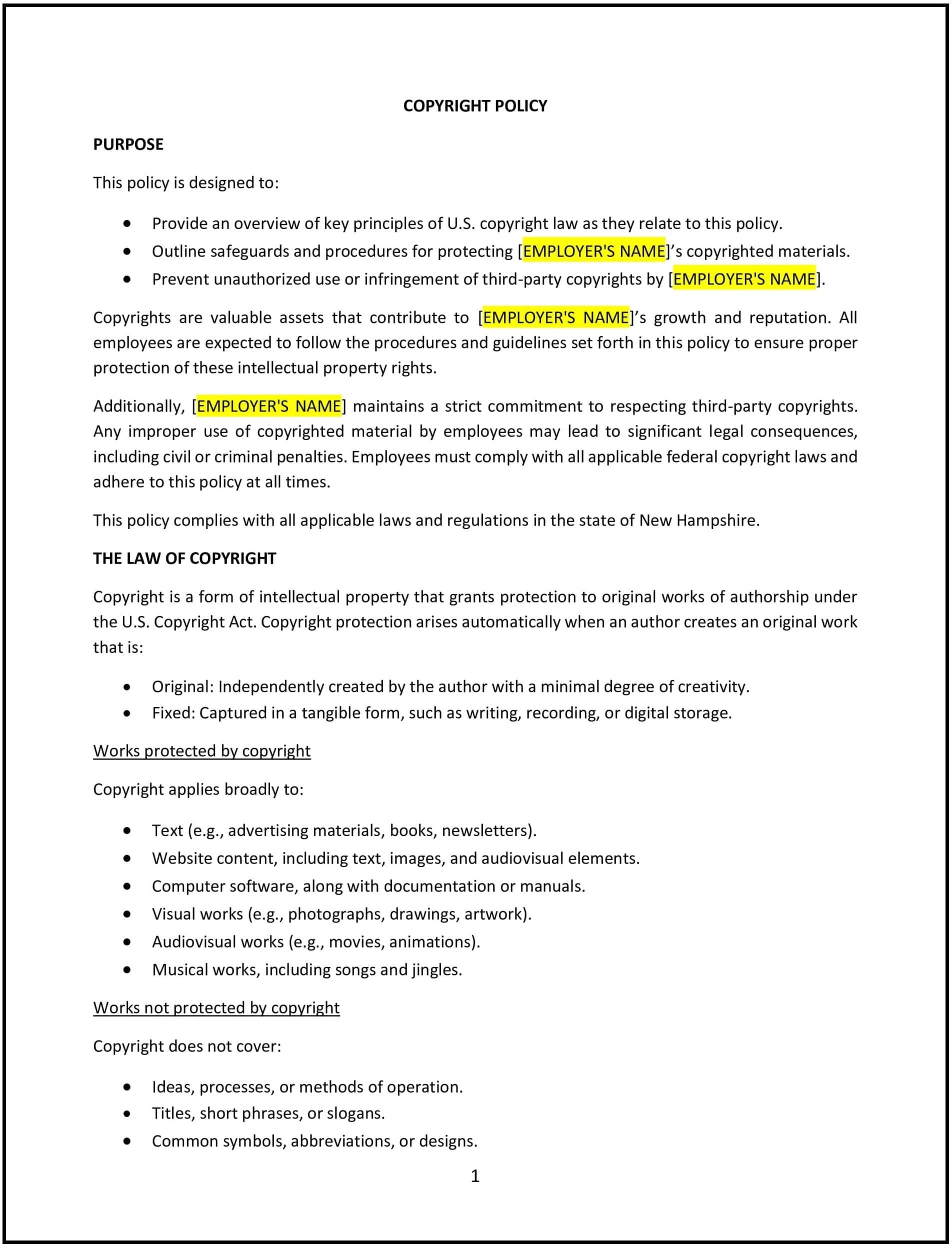Got contracts to review? While you're here for policies, let Cobrief make contract review effortless—start your free review now.

Customize this template for free
Copyright policy (New Hampshire)
A copyright policy helps New Hampshire businesses protect their intellectual property and avoid infringement of others' copyrights. This policy outlines the procedures for using copyrighted materials, obtaining permissions, and respecting copyright laws in business operations.
By adopting this policy, businesses in New Hampshire can mitigate the risk of copyright infringement, promote responsible use of intellectual property, and safeguard their own creative works.
How to use this copyright policy (New Hampshire)
- Define copyrighted materials: Clearly explain what constitutes copyrighted material, such as text, images, music, software, and other intellectual property owned by the business or third parties.
- Set guidelines for using third-party content: Outline the process for obtaining permission or licenses to use copyrighted materials, including ensuring that all content is properly credited and that fair use laws are respected.
- Protect company-created content: Specify how employees should handle and protect content created by the company, such as ensuring that any work created by employees in the course of employment belongs to the company and is not used outside of authorized purposes.
- Implement a process for reporting infringements: Provide a clear procedure for reporting suspected copyright infringements, whether they involve the unauthorized use of company content or the infringement of others' copyrights.
- Outline consequences for violations: Define the actions the business will take in response to copyright violations, such as issuing takedown notices, seeking legal remedies, or disciplining employees who violate the policy.
- Educate employees on copyright laws: Offer training or resources to ensure employees understand copyright law, fair use, and how to avoid violating copyright protections.
- Review and update: Regularly review the policy to reflect updates to New Hampshire copyright laws and best practices for intellectual property management.
Benefits of using this copyright policy (New Hampshire)
This policy provides several benefits for New Hampshire businesses:
- Protects intellectual property: Ensures that the business's creative works, such as software, marketing materials, and other original content, are protected from unauthorized use.
- Reduces legal risks: Helps businesses avoid the legal and financial consequences of copyright infringement by setting clear guidelines for using third-party materials and respecting copyright laws.
- Encourages ethical practices: Promotes ethical use of intellectual property both internally and externally, reducing the likelihood of inadvertent copyright violations.
- Improves company reputation: Demonstrates that the business values intellectual property rights and fosters a culture of respect for creative works, which can enhance its reputation in the industry.
- Supports compliance with the law: Helps the business remain compliant with both New Hampshire state laws and federal copyright regulations.
Tips for using this copyright policy (New Hampshire)
- Communicate the policy clearly: Ensure all employees are aware of the copyright policy and understand the importance of respecting copyright laws in their work.
- Train employees: Offer training on copyright laws, including what constitutes fair use, how to obtain permissions for third-party materials, and the importance of respecting intellectual property rights.
- Use licenses and permissions: Make sure that all third-party content used by the business is properly licensed, and obtain written permission when necessary to avoid copyright infringement.
- Monitor usage: Regularly check that employees are following the copyright policy, particularly when it comes to using content owned by others.
- Review the policy regularly: Update the policy as needed to reflect changes in New Hampshire state laws, federal regulations, or business practices regarding intellectual property.